The Simple Truth About Composting
8 Myths Debunked
You know that compost is great for your garden. You even appreciate how composting kitchen scraps and yard waste reduces the amount of material going into the landfill. But if you're reluctant to start composting, gain confidence by learning the myths vs. facts.
The truth is that composting is easy and rewarding, and adding compost to your soil is the single best thing you can do for your plants. We're here to debunk some common myths about composting.
Myth 1: It's too complicated.
Fact: Making compost is an easy and natural process. Organic materials want to break down into compost. (Consider how leaves on the forest floor decompose, releasing nutrients back to the trees.)
Myth 2: You have to follow a recipe.
Fact: Although complex compost recipes exist, you can easily create high-quality compost by layering a variety of moist ingredients (like kitchen scraps) and dry ingredients (like dried leaves). Scroll down to Getting Started for easy how-to tips.
Myth 3: It takes too long.
Fact: While an open pile that never gets turned might take several seasons to decompose, with an efficient tumbling composter you can have nutrient-rich finished compost in as little as six weeks!
Myth 4: Compost attracts rodents.
Fact: Using an enclosed composter is one sure-fire way to deter vermin. Stick to vegetable scraps and yard waste; placing meat or dairy products in your compost pile will attract rodents, as well as dogs and cats.
Myth 5: Compost smells bad.
Fact: Compost has an odor only when it's too wet or there's too much nitrogen. The simple techniques outlined in the Getting Started section will keep your compost pile "cooking" properly and prevent odors.
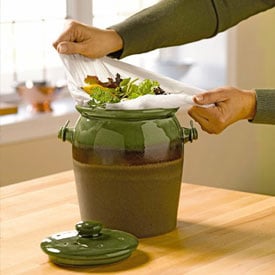
Myth 6: Collecting kitchen scraps is messy.
Fact: Place an attractive compost crock on your counter as a convenient way to collect scraps. Biodegradable liners that you can toss right into your compost bin make clean-up a breeze.
Myth 7: It takes a lot of space.
Fact: Small-space bins, such as our Eco Stack Composter take up as little as four square feet!
Myth 8: You must have a place outdoors to set up a bin.
Fact: Worm composting, also called vermicomposting, is one way to compost indoors. If worms aren't your cup of tea, there are electric composters that automatically heat and aerate scraps for efficient indoor composting.
"BROWN" INGREDIENTSLots of carbon, little moisture. dried leaves straw coir wood chips |
"GREEN" INGREDIENTSLots of nitrogen and moisture. vegetable and fruit scraps fresh lawn clippings freshly pulled weeds coffee grounds |
Getting Started
Whether you're composting in a pile or using a composter, here are some tips for easy, efficient and odor-free composting.
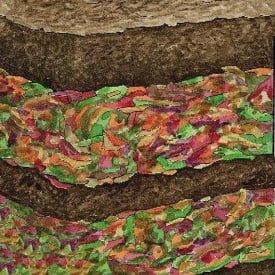 Layered compost ingredients
Layered compost ingredients- Alternate layers of dry and wet ingredients. Think of your compost like a layer cake, alternating dry with moist. Most people have more wet materials than dry, except perhaps during fall when dried leaves are plentiful. One easy solution is to keep a covered container of dry ingredients — a stash of your own dried leaves or purchased straw or coir (shredded coconut husks) — near your pile or bin.
- Toss in a shovelful of finished compost or garden soil. Both contain microbes that will help get your compost cooking. Or purchase a compost activator like Super Hot Compost Starter that contains beneficial microbes.
- Keep it moist but not soggy. Too much water and the composting materials may begin to smell. Too little water and there won't be much microbial activity. Think of your compost pile as a wrung-out sponge moist but not saturated, with plenty of air pockets. Keep open compost piles covered to prevent rain from saturating the materials.
- Keep it aerated. A rotating compost tumbler makes this task easy. Otherwise, use an aerator tool or a garden fork to fluff ingredients every few weeks, creating air pockets to help the microbes do their work. Locating your compost bin or pile in the sun will increase the temperature, speeding up the composting process. However, the materials will dry out faster, especially in warm climates, so you'll need to be extra mindful of maintaining the proper moisture level. More and more municipalities are mandating that homes and businesses separate food scraps and other compostable materials from their trash, diverting a sizeable volume of waste from landfills. The food waste can be composted at home or placed in a separate bin for curb-side pickup.
Print this Article:
Get the Dirt
Stay up to date on new articles and advice. Please fill out the information below.

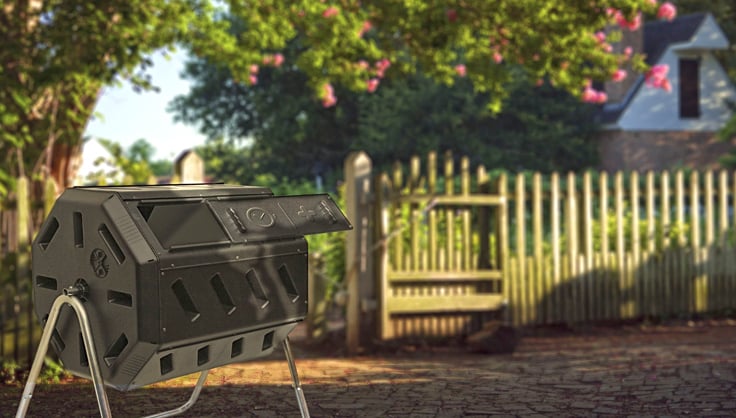
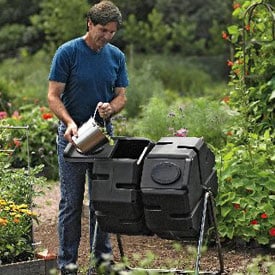
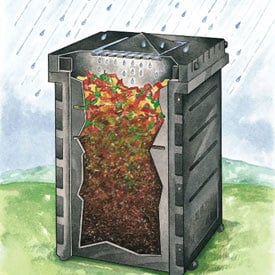 Pyramid Composter
Pyramid Composter